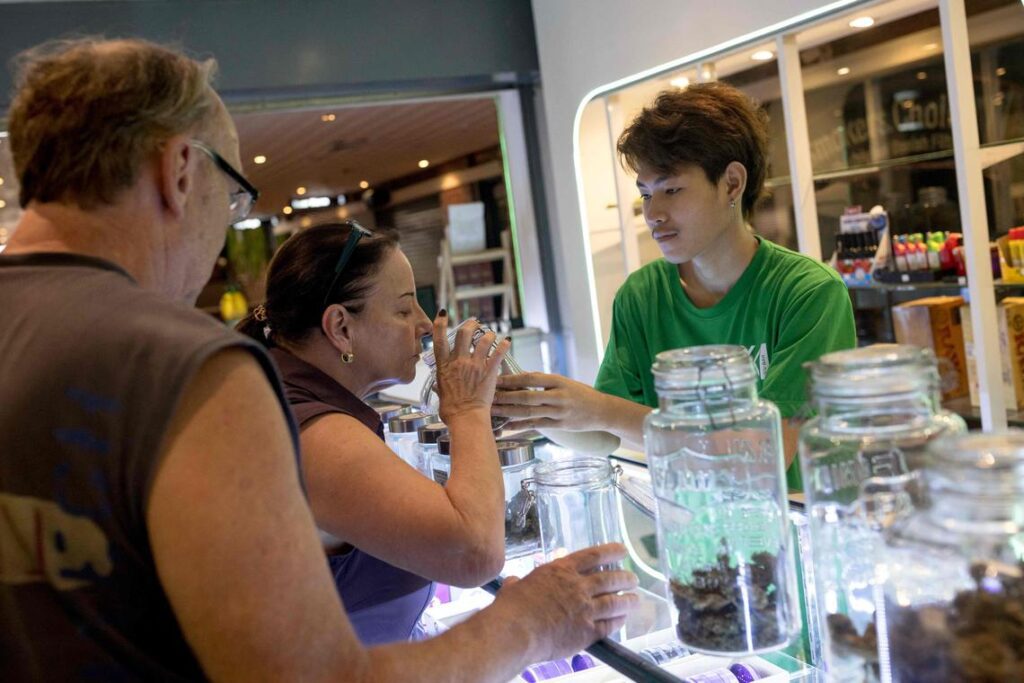BANGKOK – In a landmark decision, Thailand has emerged as the first Asian nation to decriminalize cannabis, leading to a transformative boom in weed-related businesses across the country. From Bangkok to Chiang Mai, neon-lit signs featuring cannabis leaves are becoming commonplace, and the influence of cannabis can be felt throughout various sectors including food, beverages, and cosmetics. This rapid expansion is further fueled by the anticipation of profits from weed tourism.
However, as the industry flourishes, it finds itself navigating a precarious political landscape. Companies operating in this burgeoning market exist in a regulatory grey zone, as legalization occurred before lawmakers could establish a comprehensive regulatory framework.
Concerns within society regarding the implications of legalization pose a significant threat to an industry projected to exceed over US$1 billion (approximately S$1.4 billion) by 2025. “This is about politics. The government has come this far, but coalition parties are expressing a desire to roll back the changes,” stated Mr. Rattapon Sanrak, founder of the advocacy group behind Highland Cafe, a popular dispensary in Bangkok. “Criminalizing it again would only push it underground,” he cautioned.
Pending Regulations
Lawmakers are poised to resume discussions on a proposed cannabis Bill aimed at bringing regulatory clarity to the industry, with debates set to resume as early as next week. This proposed Bill previously faced setbacks after some legislators withdrew it from discussion in September, citing insufficient measures to curb recreational use of cannabis.
Although the government has emphasized that decriminalization was intended for medical and commercial applications rather than recreational use, the draft Bill does not explicitly prohibit public use, although it does include restrictions such as:
- Prohibiting public smoking
- Banning sales to pregnant women or individuals under 20
- Restrictions on commercial advertising
Diverse Opinions on Legalization
The ambiguous legal environment has left cannabis users and entrepreneurs wary of potential governmental pushback. Calls for reevaluation of cannabis classification as a narcotic have intensified, with over 15,000 signatures gathered on a petition from students, parents, and educators demanding such measures. Following a tragic shooting incident at a preschool in October linked to drug activities, opposition parties have heightened their anti-drug campaigns ahead of upcoming elections.
However, cannabis advocates argue that legalization has revitalized cities heavily impacted by COVID-19 restrictions and has reinvigorated the tourism-dependent economy. The Tourism Authority of Thailand has even promoted cannabis experiences, encouraging travelers to explore organic cannabis farms and indulge in cannabis-infused massages.
According to data from the public health ministry, over a million licenses have been issued via the government’s mobile application for cannabis cultivation since the decriminalization on June 9.
Potential Economic Benefits
The influx of cannabis tourism is undeniable, especially in locales like Bangkok’s Khaosan Road, which recently introduced a “cannabis complex” featuring more than a dozen dispensaries. These venues offer a variety of products including buds, edibles, tea, massage oils, and more. “Thailand is already big on tourism, and cannabis adds value to all other businesses,” remarked Mr. Worawut Ngamthanawit, co-owner of Joint Us, a shop located in the Plantopia Weed City complex.
First-time visitors like Justin George from Canada affirm that their trips were motivated by the legalization of cannabis. “It’s the reason I came to Thailand. I wouldn’t have come otherwise,” he stated, highlighting its role in alleviating his chronic back pain.
Community Revitalization
In the bustling Sukhumvit area, Mr. Soranut Masayavanich, owner of the Sukhumweed dispensary, elaborates on how cannabis has rejuvenated not only his business but the wider community. “Money is flooding into the country. We haven’t seen Thailand this energized in a long time,” he stated, noting that surrounding restaurants are also flourishing thanks to the increase in foot traffic.
Restaurant owner Chainat Rodsukho echoed similar sentiments regarding the positive influence of the dispensary, stating, “They’ve caused no trouble, and their customers have been courteous. Some have even become my customers.”
Sukhumweed proudly carries local products, such as a hemp-infused lip balm playfully adorned with an illustration of Health Minister Anutin Charnvirakul, who promoted cannabis liberalization as part of his party’s campaign during the 2019 election. Defending the decriminalization policy, Dr. Anutin claimed that the current draft Bill is robust enough to prevent misuse. He criticized opposition efforts as politically motivated and affirmed his party’s commitment to cannabis reform.


